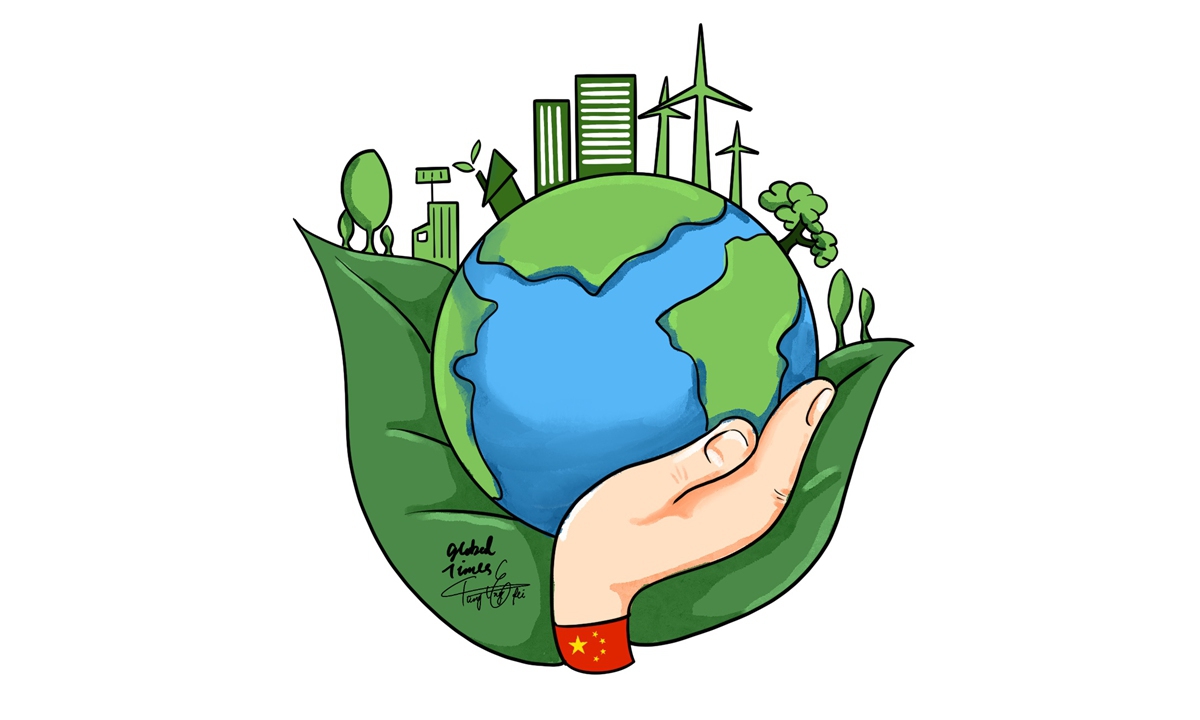
Illustration: Tang Tengfei/GT
Extreme climate events, including longer-lasting heat waves and cascading flash floods, seem to have dominated our living planet this summer. Global climate change - resulting from accumulation of heat-trapping greenhouse gases in the outer atmosphere - becomes increasingly "irreversible" if nothing is done now.Tens of millions of people in Asia, from Japan, China to India and Southeast Asia are sweltering under relentless heat waves one after another since early July. In the US, from southern California to Texas to the lower Mississippi Valley and southern Florida, record-breaking heat is blanketing the region, as the world grapple with rocketing temperatures.
It is true that the weather patterns on Earth are systemically being reshaped by climate change, caused by incessant emissions of plumes of carbon dioxide since 1900s when the industry revolution started. If the humanity doesn't act now to reduce our carbon-print by drastically cutting fossil fuel use and greenhouse emissions to the atmosphere, the current heat waves, flash floods, landslides, droughts and crop failures, will only get more serious and worse, threatening our own survival.
Climate change will mean that we have more heat waves and the future days will be hotter and longer than they are now. Meteorologists have warned the frequency and intensity of extreme weather events will continue to increase as the human-caused climate crisis worsens.
In China, a total of six weather stations scattered across the country detected extreme temperatures of more than 50 degrees Celsius (122 Fahrenheit) on Monday and Tuesday, all among the hottest days in history. In the capital city Beijing, the officials again issued heat "red alerts" warning residents with preconditions to take precautions on Monday, following a record hot summer the city saw in early July when temperatures soared past 40 degrees Celsius.
Heat waves also struck parts of Japan, where temperatures rose to highs of 39.7 degrees Celsius (103 Fahrenheit) in Gunma on Honshu Island, the country's most populous region which also houses Tokyo. In South Korea, the abnormal weather pattern brought torrential downpours there. On Saturday, at least 13 people in the central South Korean city of Cheongju died after floods from a burst riverbank inundated an underpass, trapping vehicles including a public bus.
Our planet is reckoning with the deadly effects of extreme summer weather, as many countries in the northern hemisphere endure blistering heat waves and record-breaking rainfall as well as severe droughts and crop failures in some places. Many governments are warning residents to prepare for more extreme days to come.
In its annual climate update, the World Meteorological Organization said the world is on track to breach a critical climate threshold in the coming five years as global temperatures continue to climb above pre-industrial levels.
The 2015 Paris Agreement in which nearly every country pledged to reduce greenhouse gas emissions to constrain average global temperatures from growing up more than 1.5 degrees Celsius from pre-industrial levels. That's the threshold beyond with scientists say the likelihood of catastrophic climate patterns significantly increase.
For many Americans and Canadians, climate change used to be a distant concern, but the crisis has now arrived on their doorsteps. Hundreds died in unprecedented triple-digit heat in British Columbia, Oregon, Washington and other western US states in June 2021, when a super "heat dome" of enormous proportions struck the region and lingered there for days. Television footage showed people collapsed trying to make their way to cooling shelters. And, last month, a large swath of Canada's eastern forest was on fire, sending flumes of haze and smoke across borders to blanket New York City and other US cities. The suffocating haze is another vindication of the deterioration of our planet's environment and ecosystem caused by climate change.
Now it's time for all nations on this globe to get serious in mounting collective efforts to fight the extreme weather from cripple our living environment.
The world did little during the four years of former US President Donald Trump, whose administration refutes Earth's atmospheric change calling it a "conspiracy", although severe weather is causing an estimated $100 billion in economic damage to the US every year. Trump was more interested in fighting trade and technology wars than waging a battle to alleviate the world's climate crisis.
John Kerry, President Joe Biden's special envoy for climate change, is visiting China currently to restart global warming negotiations between the world's two largest economies and also the two largest gas emitters. The policies of China and the United States will have an outsize impact on whether the world will avert the worst consequences of global warming.
China's central government has made two signature commitments on climate, pledging that the country's emission of carbon dioxide should peak before 2030, and the country will achieve "carbon neutrality" before 2060, when the amount of carbon emissions into the atmosphere will be offset by the forests and other high-tech methods.
Since 2018, the Chinese government has been particularly keen in advancing new-energy development and sales expansion of electric vehicles. A number of Chinese automakers have begun to send internal combustion engines to the scrap heap and are currently pouring billions of yuan to make electric motors and batteries.
Driven by favorable taxation and fees from the government, droves of Chinese urbanities are switching to buy electric cars in the country's megacities such as Beijing, Shenzhen and Shanghai, where nearly all taxi cabs and public buses are now electricity-driven. Thanks to the government's preferential policies, China's electric vehicle sales are expected to exceed 8.95 million in 2023, accounting for more than 35 percent of all vehicle sales.
Some people claim that our planet will continue to warm, species will become extinct, crops will fail, the oceans will rise and grow warmer, and, there will even be widespread famine and deaths. Facing this dire prospect, we must stop arguing who is responsible now, ramp up our actions to resolutely curb fossil fuel use, and effectively control climate change, because we don't want to ruin the only shared home we have.
The author is an editor with the Global Times. bizopinion@globaltimes.com.cn



